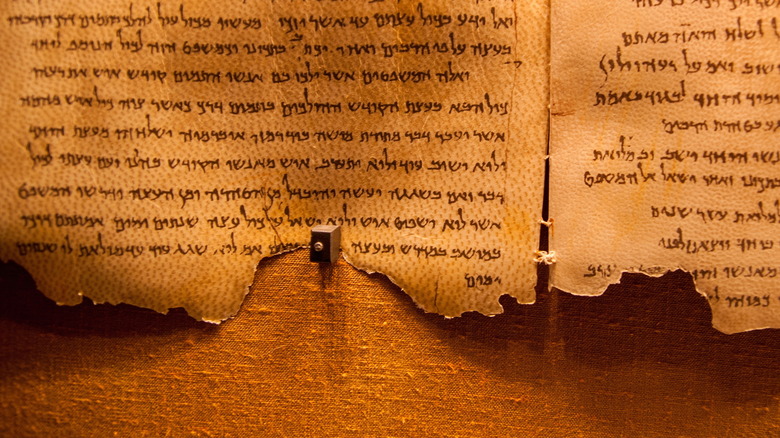The One Dead Sea Scroll Nobody's Been Able To Solve
The accidental discovery of the first Dead Sea scrolls near the ancient Qumran settlement in the Judaean Desert gave historians thousands of fragments to piece together the history of Jewish and Hebrew religious beliefs, per History. But while the scrolls are invaluable for understanding the Jewish world when Jesus Christ was believed to be alive, as The Conversation noted, they are still steeped in mystery. To this day, nobody knows who wrote the mysterious manuscripts, and one scroll in particular has yet to be cracked.
The Copper Scroll continues to puzzle historians. The manuscript contains what appears to be a treasure map written into copper that outlines between 61 to 64 gold and silver stashes in Judea. The unique etching differs from the animal skins and parchment used by the other scrolls and is believed to be linked to an attempt to help the map survive over the years. Yet no treasure has ever been found, even after the excavation of some of the locations.
The scroll is believed to map treasure from the Jerusalem Temple
Despite its impenetrable nature, historians have taken a shot at unlocking the secrets of the Copper Scroll, with its mix of Hebrew and Greek characters. Per Biblical Archaeology Society, Joan E. Taylor of King's College London believes that what is known about the scroll thus far suggests that it maps the treasure of the Jerusalem Temple. "The enormous size of the treasure, as well as the presence of cultic terminology (e.g., references to tithes, priestly vestments) included in the text, indicates the treasure's sacred origin," she wrote in "Secrets of the Copper Scroll," which was published in 2019 in Biblical Archaeology Review (posted at Academia).
There are other theories that also attempt to make sense of the enigmatic manuscripts and the ancient treasure they point to. History noted that some believe the treasure might have belonged to local Essenes, a Jewish group described by New World Encyclopedia as ascetic and strict. Others think the Romans swept up the riches as they pillaged Judea in the first century CE. Still other researchers are even less optimistic and suggest the riches might have never existed to begin with.

